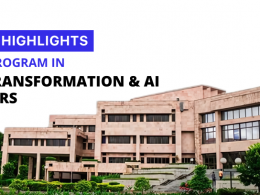In the ever-evolving landscape of digital transformation, few technologies have made as profound an impact as blockchain. Imagine a world where trust is inherent, data is secure, and transactions are transparent.
Blockchain technology is making this a reality, and in this blog, we’ll embark on a journey to unravel the extraordinary ways in which it is revolutionizing digital transformation.
Blockchain is a distributed and decentralized digital ledger technology that records transactions across multiple computers in a way that ensures the security, transparency, and immutability of the data.
Each set of transactions, known as a “block,” is linked to the previous one, forming a chronological chain of blocks. This technology is characterized by its ability to create a transparent and tamper-resistant record of transactions, making it particularly valuable in fields like finance, supply chain, and identity verification.
It relies on consensus mechanisms to validate and add new transactions to the ledger, and the data is accessible to all participants in the network, enhancing trust and reducing the need for intermediaries.
Have you ever wondered?
1. What is the driving force behind the transformative potential of blockchain technology in the realm of digital transformation?
Blockchain is not just a buzzword; it’s a game-changer. It’s reshaping industries by providing a secure, efficient, and transparent way to record and verify transactions. From finance and supply chain to healthcare and beyond, blockchain’s influence is profound.
2. How can blockchain empower individuals and businesses alike to seize new opportunities and navigate an increasingly digital world?
The technology isn’t just about cryptocurrencies; it’s about reimagining how we manage and protect data, conduct transactions, and build trust in the digital age. It offers a distributed ledger that’s incorruptible and immutable.
Let’s dive into the captivating world of blockchain and its impact on digital transformation:
1. Decentralization and Trust
Blockchain’s core principle is decentralization. It removes the need for intermediaries like banks or clearinghouses. Transactions occur directly between parties, reducing the risk of fraud and increasing trust. In industries like finance, this means faster, cheaper, and more secure transactions.
2. Smart Contracts for Automation
Smart contracts, self-executing contracts with the terms of the agreement directly written into code, are a hallmark of blockchain technology. They automate processes, making them faster and more efficient. Imagine a future where agreements, from insurance claims to property transfers, execute themselves with the utmost transparency.
3. Data Security and Privacy
One of the most significant concerns in the digital age is data security. Blockchain uses cryptographic techniques to secure data, making it nearly impervious to hacking. This is a game-changer in industries that deal with sensitive data, such as healthcare and identity management.
4. Supply Chain Transparency
Supply chains can be incredibly complex, making it challenging to track products from origin to destination. Blockchain offers transparency by recording every step of the supply chain process, reducing fraud and ensuring product authenticity. This is critical in industries like food safety and luxury goods.
5. Enhanced Digital Identity
The current system for managing digital identities is fragmented and often insecure. Blockchain can provide a unified and secure digital identity that individuals control. It can streamline processes like KYC (Know Your Customer) in the financial sector and improve security for online services.
6. Tokenization and Asset Management
Blockchain enables the creation of digital tokens representing real-world assets, from real estate to art. This not only makes assets more liquid but also opens up investment opportunities to a broader audience.
7. Cross-Border Payments and Financial Inclusion
Blockchain technology has the potential to make cross-border payments faster and more affordable. This can significantly impact the financial inclusion of people in underserved regions, allowing them to access banking services they couldn’t before.
The integration of blockchain technology into digital transformation is more than just a technological advancement; it’s a paradigm shift. It’s a move towards a world where data is secure, trust is built-in, and transactions are transparent. As industries continue to adopt blockchain solutions, we can expect to see not only increased efficiency and security but also entirely new business models and opportunities.
Blockchain technology’s influence on digital transformation is profound and far-reaching. Its decentralized nature, smart contracts, and data security capabilities are reshaping industries and how we conduct business.
As we continue to explore the limitless potential of blockchain, it’s clear that we’re on the brink of a digital transformation that will empower individuals and businesses in unprecedented ways. The revolution is here, and it’s being driven by blockchain.
Join Accredian’s Executive Program in Digital Transformation and shape the future of your career.
Your transformative learning experience awaits!






